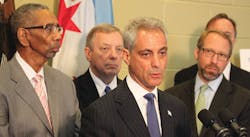USDOT Announces $20M TIGER Grant to Modernize Chicago's 95th Street Terminal
The U.S. Department of Transportation announced a $20 million grant to repair and update the Chicago Transit Authority’s (CTA) fourth-busiest rail station, which also serves as a major bus terminal. The project is one of 47 transportation projects in 34 states and the District of Columbia selected to receive funding under the U.S. Department of Transportation’s highly competitive $500 million TIGER (Transportation Investment Generating Economic Recovery) 2012 program.
“Across the country, the TIGER program is putting Americans back to work improving transit facilities and expanding transportation access in communities nationwide,” said U.S. Transportation Secretary Ray LaHood. “President Obama’s support for an America built to last is putting people back to work across the country building roads, bridges and other projects that will mean better, safer transportation for generations to come.”
The $140 million terminal overhaul will make much-needed repairs and updates to the 43-year-old bus and rail facility that will improve accessibility for commuters, especially elderly riders and people with disabilities. The project supports the long-term efficiency, reliability and sustainability of an essential transit terminal on Chicago’s South Side. A portion of the grant will be used to support an innovative, low-cost TIFIA (Transportation Infrastructure Finance and Innovation Act) loan for up to one-third of the project's cost. The TIFIA program provides federal credit assistance in the form of direct loans, loan guarantees and standby lines of credit to finance surface transportation projects of national and regional significance.
“With transit ridership on the rise in Chicago and around the country, access to affordable public transit that’s safe, clean, reliable and desirable is more important than ever,” said Federal Transit Administrator Peter Rogoff, at a grant announcement event at Chicago’s 95th Street Terminal.
Nationwide, there is an estimated $78 billion backlog in critical rail transit repair needs in cities such as Chicago, New York, Atlanta, Philadelphia, and San Francisco. CTA alone, which serves 1.6 million riders daily, faces $7 billion in capital needs and repairs over the next four years. All of Chicago’s transit services combined face a 10-year, $24 billion backlog to repair and replace rail cars, rail stations, and rail bridges that are past their useful lives.
The TIGER program is a highly competitive grant program that funds innovative projects that are difficult to fund through other federal programs. In many cases, these grants will serve as the final piece of funding for infrastructure investments totaling $1.7 billion in overall project costs. These federal funds are being leveraged with money from private sector partners, states, local governments, metropolitan planning organizations and transit agencies.
TIGER has enjoyed overwhelming demand since its creation, a trend continued by TIGER 2012. Applications for this most recent round of grants totaled $10.2 billion, far exceeding the $500 million set aside for the program. In all, the Department received 703 applications from all 50 states, U.S. territories and the District of Columbia.
The grants will fund a wide range of innovative transportation projects in urban and rural areas across the country:
- Of the $500 million in TIGER 2012 funds available for grants, more than $120 million will go to critical projects in rural areas.
- Roughly 35 percent of the funding will go to road and bridge projects, including more than $30 million for the replacement of rural roads and bridges that need improvements to address safety and state of good repair deficiencies.
- 16 percent of the funding will support transit projects like the Wave Streetcar Project in Fort Lauderdale.
- 13 percent of the funding will support high-speed and intercity passenger rail projects like the Raleigh Union Station Project in North Carolina.
- 12 percent will go to freight rail projects, including elements of the CREATE (Chicago Region Environmental and Transportation Efficiency) program to reduce freight rail congestion in Chicago.
- 12 percent will go to multimodal, bicycle and pedestrian projects like the Main Street to Main Street Multimodal Corridor project connecting Memphis and West Memphis.
- 12 percent will help build port projects like the Outer Harbor Intermodal Terminal at the Port of Oakland.
- Three grants were also directed to tribal governments to create jobs and address critical transportation needs in Indian country.
Over the next six months, 27 projects are expected to break ground from the previous three rounds of TIGER. In addition, work is under way on 64 capital projects across the country.
On November 18, 2011, the President signed the FY 2012 Appropriations Act, which provided $500 million for Department of Transportation national infrastructure investments. Like the first three rounds, TIGER 2012 grants are for capital investments in surface transportation infrastructure and are awarded on a competitive basis. This is the fourth round of TIGER funding.
Under all four rounds combined, the TIGER program has provided $3.1 billion to 218 projects in all 50 states, the District of Columbia and Puerto Rico. Demand for the program has been overwhelming, and during all four rounds, the Department of Transportation received more than 4,050 applications requesting more than $105.2 billion for transportation projects across the country.
The fiscal year 2013 appropriations bill currently under consideration in the U.S. Senate provides $500 million for a future round of TIGER grants.
Click here for additional information on individual TIGER grants.
